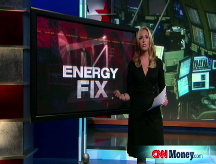Democrats: Crackdown on oil speculators
Senate Democrats 'Stop Excessive Speculation Act' gives CFTC more leeway to punish oil price manipulation.
WASHINGTON (CNN) -- Legislation meant to crack down on oil speculators passed a key test vote in the Senate on Tuesday.
The test vote on the legislation, which was backed by the Democratic leadership, was 94-0. The support of 60 senators was needed for debate on the bill to proceed. It was unclear when a final vote on the legislation would occur.
With gas prices edging over $4 a gallon, lawmakers have been working on new legislation meant to lower prices at the pump.
Sen. Byron Dorgan of North Dakota, one of the Democrats sponsoring the oil speculation bill, says the quickest way to do that is to stop speculators from driving up the price of a barrel of oil.
"First things first. If you are running a race with hurdles, jump the first hurdle first," Dorgan told reporters Monday. "The reason we have oil at $130, $140, $145 a barrel - like a roman candle going up, up, up - is because we have excessive, relentless speculation in these markets.
"Nothing in supply and demand in the last year justifies the price of oil," he added.
Mark Cooper of the Consumer Federation of America argued that market fundamentals do not explain a $40 to $60 per barrel "speculative premium" which he believes exists on the price of oil.
On Monday, a barrel of light, sweet crude closed at $131.04 a barrel, up nearly $2 from Friday's close but down from the $147 a barrel record set on July 11.
The cry to stop oil speculation has also been taken up by consumer advocates and CEOs of companies, like the major airlines, whose bottom lines are heavily dependent on the price of oil.
To raise oil speculation as an issue, the major airlines sent e-mail messages to members of their frequent-flyer programs and created a Web site, stopoilspeculationnow.com.
The Democrats' bill, dubbed the "Stop Excessive Speculation Act," is sponsored by Dorgan as well Senate Majority Leader Harry Reid and other members of the Democratic leadership.
It would provide more resources and authority to the Commodities Futures Trading Commission to detect and punish speculation, stop speculators from using foreign markets to manipulate the price of oil in the United States, require more transparency in oil markets and limit the trading of market players who do not intend to take delivery of the oil they purchase.
In particular, the bill will give the CFTC greater power to regulate the "swap" market for futures and differentiate between "legitimate" and "illegitimate" hedge trading that, the Democrats say, has lead to increased prices.
But Sen. George Voinovich, a Republican from Ohio, called the Democrats' proposal "a smoke screen."
"It may be part of the solution, but it certainly isn't the answer," he said.
Experts have also questioned the extent that speculators - rather than basic market principles of supply and demand - have driven up the price of oil.
While admitting that speculation is having some impact on the price of oil, Daniel Yergin, the Pulitzer Prize-winning oil analyst, pointed to increasing demand, particularly in China and India, as well as limited refining capacity and unrest in oil-producing areas such as the Middle East, Nigeria and Venezuela as reasons why the price of a barrel of oil has gone up.
"The result of all this is a much tighter market - in terms of the balance between supply and demand - than had been customary for several decades," Yergin told a joint congressional economic committee last month.
Yergin did, however, point to a trend in which investors spooked by the faltering U.S. economy have been buying oil, rather than gold, to protect their wealth. That has increased the price of oil, Yergin said, and has lead to ironic situation in which Americans already hit by the subprime credit crunch being hit again when they go to the pump.
President Bush and his Republican allies in Congress have been ratcheting up the political pressure on Democrats by pressing for a vote to repeal a 1981 law banning offshore oil drilling. Republicans also want a vote to open up the Arctic National Wildlife Preserve (ANWR) for oil speculation.
Senate Republicans have been negotiating with Senate Democrats for a vote on a bill that would expand oil drilling, but no deal had been struck as of Monday evening.
The move to lift the offshore drilling ban is very popular in the eyes of the public, which is suffering from the high prices at the pump. A recent CNN poll conducted by the Opinion Research Corp. found that 72% of those questioned support more offshore drilling. About a quarter - 27% - oppose lifting the ban. The poll, conducted June 26-29, has a margin of error of plus-or-minus 3 percentage points.
House Speaker Nancy Pelosi, however, told CNN's Wolf Blitzer last week that she continues to oppose expanding the offshore drilling ban and would not schedule a vote to lift the ban in the House.
"The impression that the White House has given you is that if you could drill in these protected areas, the price of gasoline will come down," Pelosi said. "Even the president in his press conference the other day acknowledged that that was not the case."
Pelosi said more drilling would take a decade to have an impact on gas prices and argued that a faster way to lower gas prices would be to release oil from the 700 million barrel Strategic Petroleum Reserve. Bush opposed that move because oil in the reserve should only be release for national emergencies, he said.
-- CNN's Ted Barrett contributed to this report ![]()


